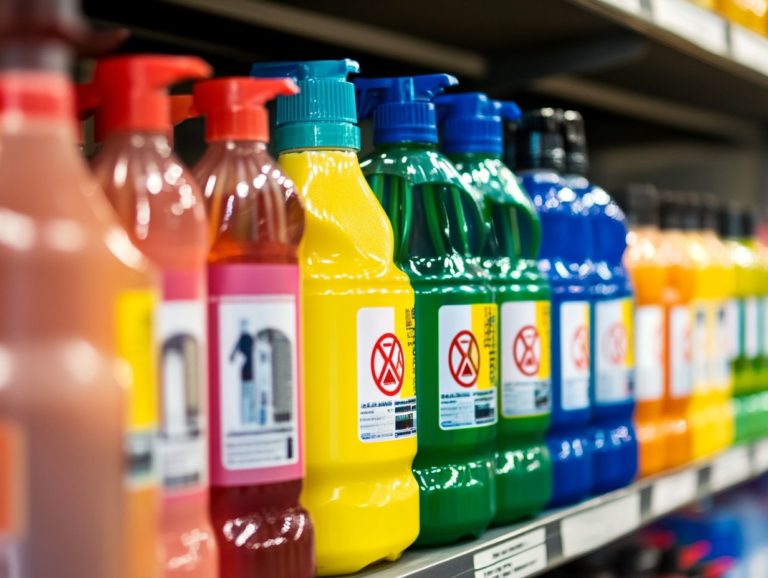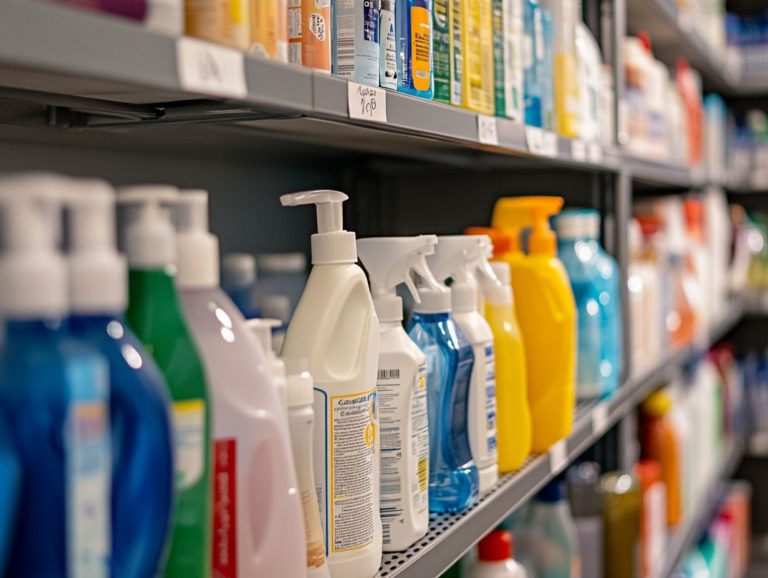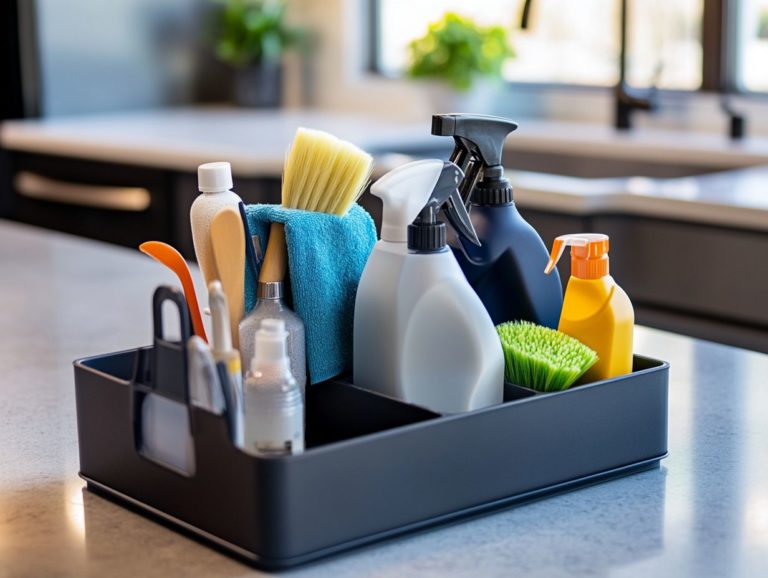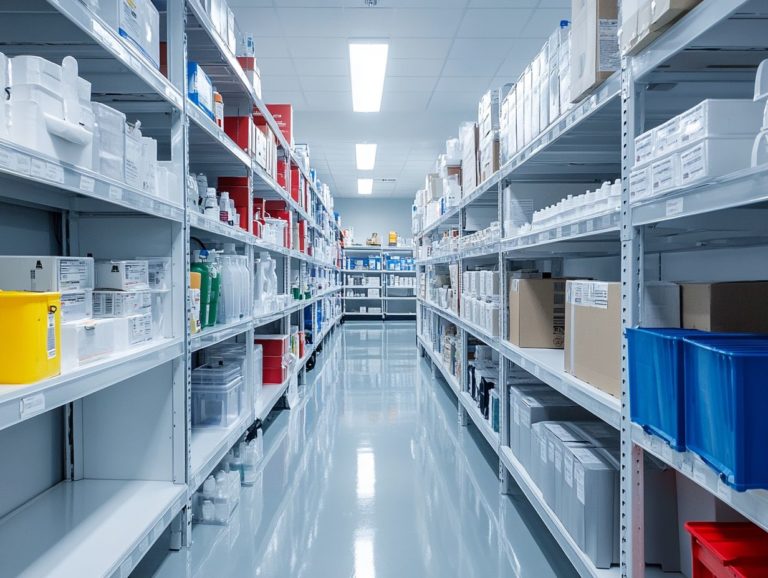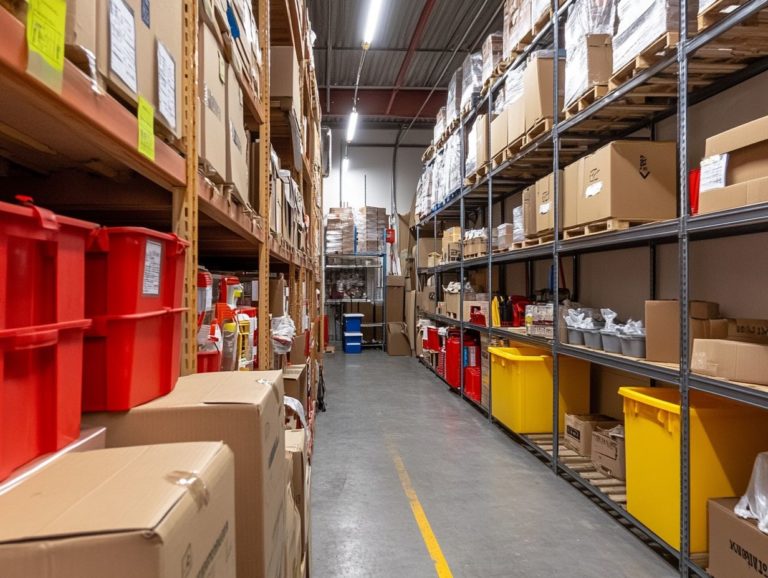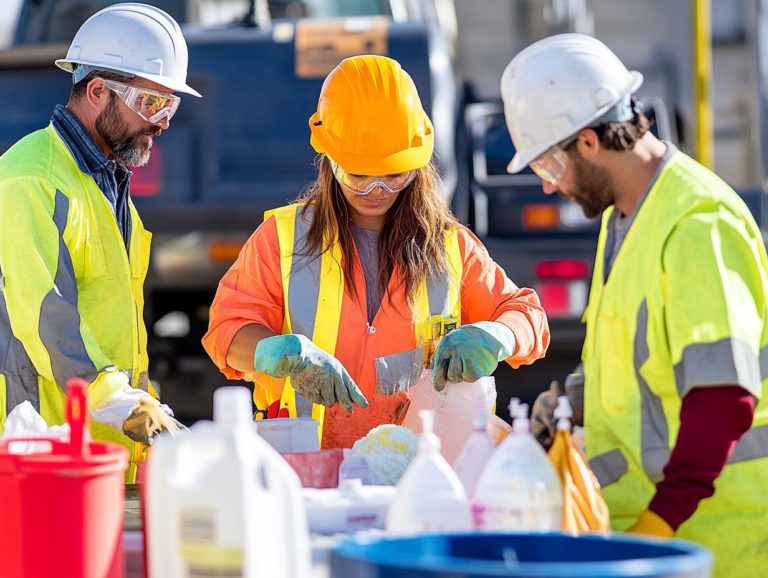Storing Large Quantities of Cleaners: Tips
Proper storage of cleaning products is crucial for ensuring safety and efficiency in your home, office, or workplace. With a wide array of cleaners, each possessing its own unique properties and potential hazards, knowing the right way to store them can prevent accidents and maintain their effectiveness.
This article delves into the significance of proper storage, the risks associated with neglecting it, and offers practical advice for safely organizing different types of cleaners. It also explains how to manage spills and responsibly dispose of unused products. Look forward to learning space-efficient storage solutions and cleaning tips that will transform how you handle your daily-use products.
Prepare to elevate your cleaning storage practices to a whole new level!
Contents
- Key Takeaways:
- Why Is Proper Storage of Cleaners Important?
- What Are the Potential Dangers of Improperly Stored Cleaners?
- How Can You Safely Store Large Quantities of Cleaners?
- What Are Some Tips for Storing Specific Types of Cleaners?
- What Should You Do in Case of a Spill or Accident?
- How Can You Properly Dispose of Unused or Expired Cleaners?
- Your Cleaning Supply Questions Answered!
- What are some tips for storing large quantities of cleaners?
- How should I store bleach and other harsh cleaners?
- What should I do if I need to store cleaners in a garage or outdoor storage space?
- Are there any cleaners that should not be stored in large quantities?
- How often should I check and organize my stored cleaners and cleaning supply storage?
- Can I mix different cleaning chemicals when storing them?
Key Takeaways:
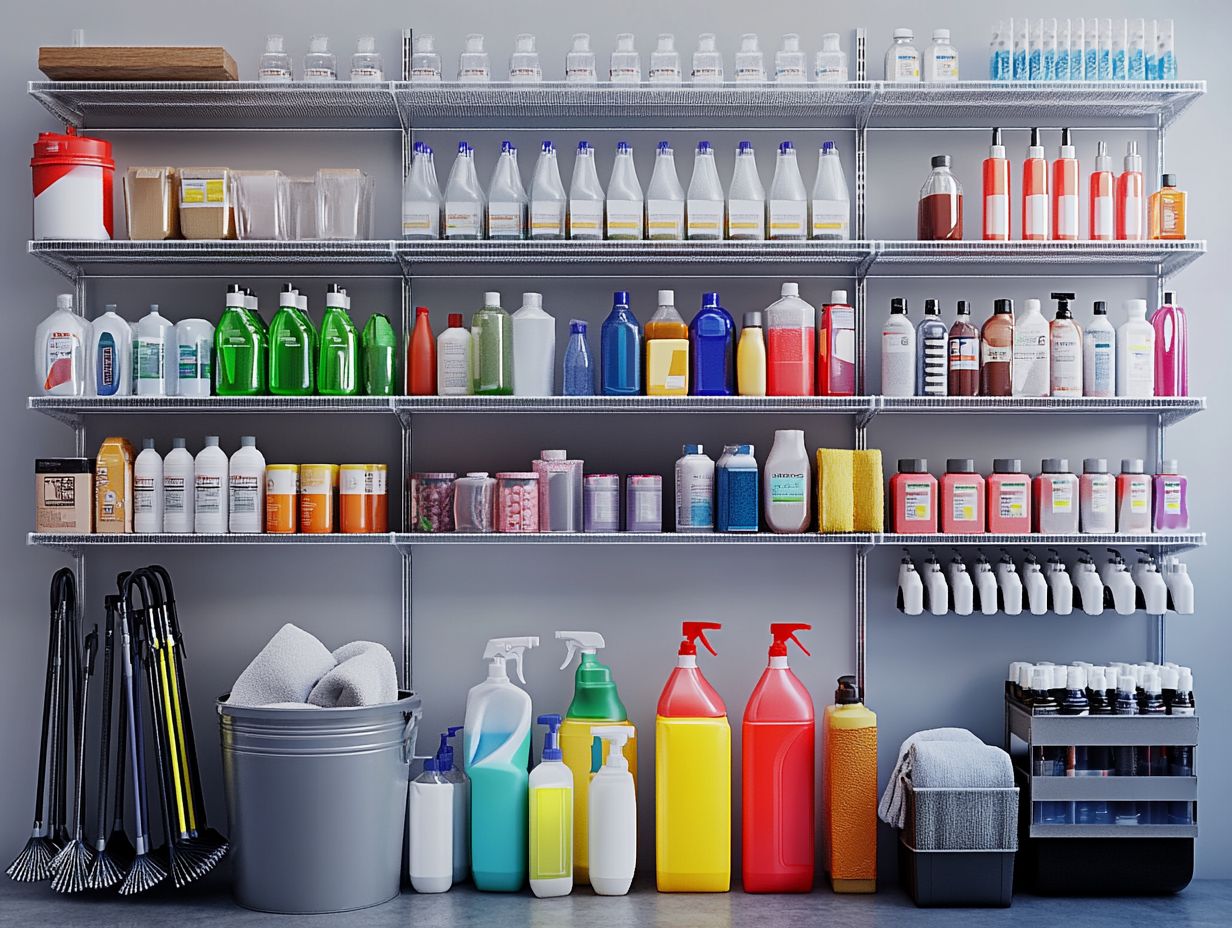
- Proper storage of cleaners and cleaning supplies is important to avoid potential dangers and accidents.
- Safely store large quantities of cleaners by choosing the right location, keeping them in their original containers, labeling clearly, and storing flammable cleaners separately in metal cabinets.
- Different types of cleaners have specific storage requirements, such as keeping bleach in a cool, dark place and storing disinfectants away from direct sunlight.
Why Is Proper Storage of Cleaners Important?
Organizing cleaning supplies effectively contributes to a safer and well-maintained living environment. Properly storing your cleaning supplies is essential for maintaining an organized home and ensuring safety. This practice helps you avoid accidents and keeps your home safe while extending the lifespan of your cleaning products, making your cleaning routine more efficient.
By adopting effective storage solutions, you ll have your cleaning essentials readily accessible. This streamlines your cleaning schedule and fosters a tidier living space. An organized cleaning closet allows you to swiftly locate your tools and chemicals when you need them, elevating your overall cleaning experience. Custom solutions can further improve your cleaning method and make your home organization more efficient.
What Are the Potential Dangers of Improperly Stored Cleaners?
Improperly stored cleaning products can present serious dangers, including chemical hazards, fire risks, and accidental poisoning. When cleaning chemicals aren’t secured, they can leak, releasing harmful fumes or spills that pose a threat to everyone in your household, particularly children and pets. Storing flammable cleaners near heat sources can lead to ignitions, which could have devastating consequences. Understanding these risks is essential for fostering a safe and organized home. Refer to cleaning tips blogs for more information on safely managing your cleaning solutions.
Neglecting to organize these products heightens the chances of accidents and complicates the cleaning process. Household members might inadvertently mix incompatible substances, resulting in toxic reactions or the release of dangerous gases.
Establishing a dedicated storage area where cleaning supplies can be securely locked away and kept out of reach of young children is crucial. Clearly labeling containers can prevent confusion and significantly reduce the risk of misuse.
Act now to implement strict safety measures and protect your home! By putting strict safety rules in place, you can drastically decrease the potential hazards associated with cleaning products, creating a safer and more efficient living space for everyone.
How Can You Safely Store Large Quantities of Cleaners?
When you find yourself with a plethora of cleaning supplies, it becomes essential to adopt safe storage practices that prioritize both accessibility and safety.
Opt for a designated storage cabinet ideally one that is childproof to keep your cleaning products organized and out of reach from curious little hands.
Embrace vertical storage solutions and bins to maximize your space, ensuring that your cleaning equipment is systematically categorized.
Consider utilizing a cleaning caddy for your frequently used items, allowing you to maintain an efficient cleaning routine without sacrificing safety.
Start transforming your cleaning storage today and enjoy a safer, more organized home!
1. Choose the Right Location
Choose a safe spot for your cleaning supplies. Look for a dedicated cleaning closet or a high shelf out of reach of kids and pets. This keeps everything tidy and your home safer.
Cabinets in laundry rooms or utility areas are ideal for housing your cleaning products while keeping them safely away from curious little hands. If you choose high shelves, ensure they are sturdy. Use a step stool to reach them safely.
Closets are another excellent choice for storage; they can be closed off, preventing access to potentially harmful chemicals.
By thoughtfully placing your cleaning supplies in these designated areas, you can streamline your cleaning processes and maintain a well-organized living space. Consider integrating vertical storage solutions and organizing ideas to maximize your storage space.
2. Keep Cleaners in Their Original Containers
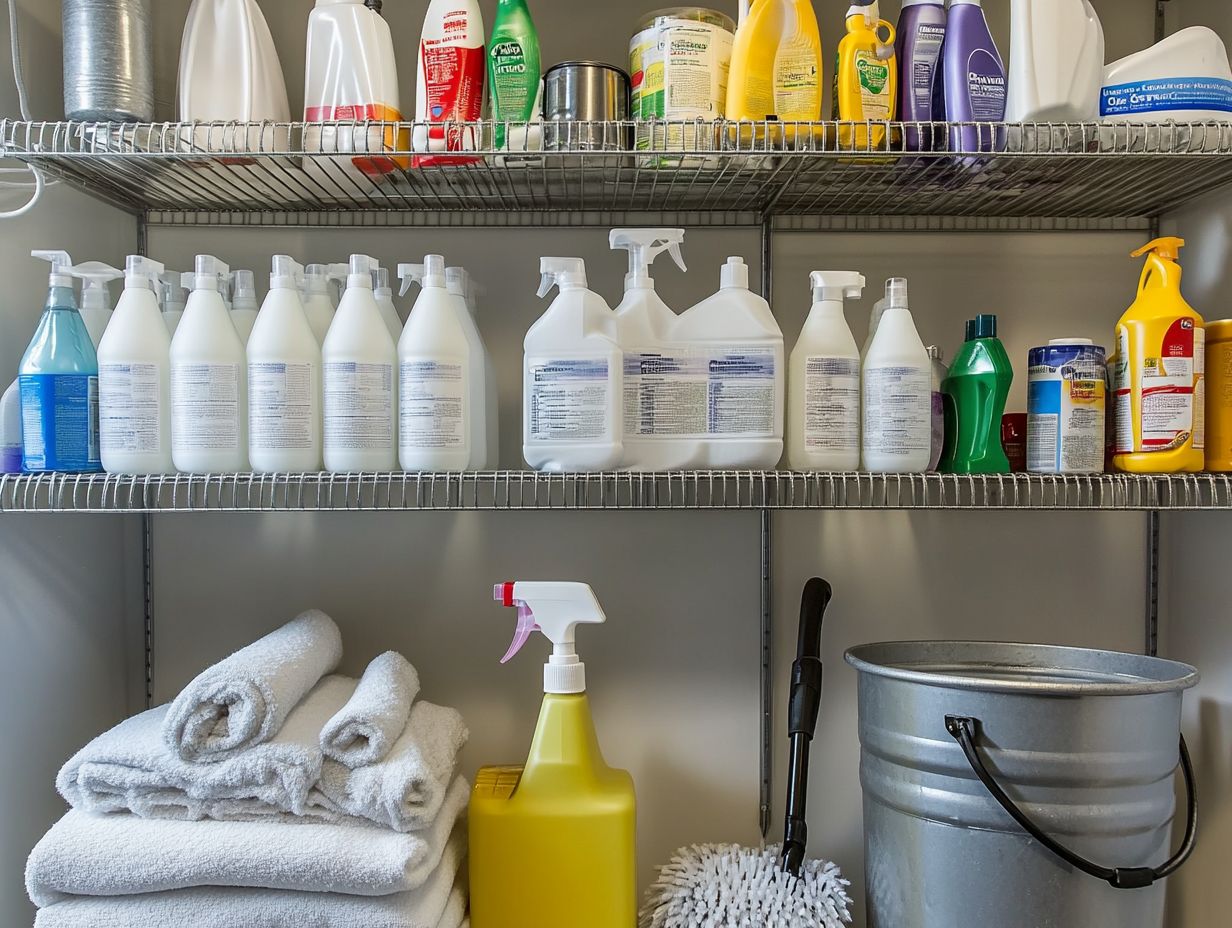
Always keep your cleaners in their original containers. They have important information like warnings about safety, usage instructions, and ingredients that help you use them right.
Transferring products into unmarked containers makes it hard to identify each solution, which can lead to accidents in your cleaning routine.
Staying organized with these supplies enhances your cleaning regimen by allowing you to quickly find the right product at a glance. Labels guide you on the correct usage and outline what to do if there’s an accident.
Clear labels prevent dangerous situations, especially with children or pets around. An organized cleaning supply area minimizes confusion and maximizes efficiency, enabling you to focus on cleaning rather than sifting through a jumble of unmarked products.
3. Label Everything Clearly
Clear labels on your containers are essential for organizing cleaning supplies. They help everyone find what they need quickly, keeping the home safe.
This practice elevates your tidying routine, saving you precious time that would otherwise be wasted searching for specific products during your cleaning tasks.
A well-structured labeling system gives you the power to maintain an efficient workflow, allowing you to grab what you need with minimal fuss. As you create your labels, consider including crucial details such as the name of the cleaning product, its usage instructions, and any relevant safety warnings.
Employing color-coded labels or symbols can further simplify the identification process, especially in homes with multiple users. By setting up a designated area for your frequently used items, you can reduce clutter, making your cleaning routines smoother and more effective.
4. Keep Cleaners Out of Reach of Children and Pets
Ensuring that cleaning products are kept out of reach of children and pets is crucial for safety. By storing cleaners in high cabinets or using childproof locks on storage areas, you can prevent accidental access to potentially harmful chemicals. This practice not only protects your loved ones but also contributes to a more organized home environment. It allows you to focus on your cleaning tasks without the worry of accidents.
Employing office supplies like Command Strips for hanging storage can further secure your cleaning kits and supplies. To enhance safety, consider using clear storage bins with lids that can be kept in a locked closet. Labeling these containers helps you identify the contents and promotes responsible usage by older children or caregivers. Clear storage bins are excellent for maintaining a tidy system and organizing your space efficiently.
Magnetic strips can be an innovative solution for smaller bottles, keeping them securely affixed to shelves and out of curious hands. Wall-mounted storage options in utility rooms or garages ensure that even larger items remain inaccessible.
These strategies create a cleaner and safer living space, where your cleaning supplies are not only properly organized but also far from mischief. Act now to keep your loved ones safe!
5. Store Flammable Cleaners Separately
Ensure you follow safety rules set by the Occupational Safety and Health Administration (OSHA) for the safe storage of flammable materials.
Storing flammable cleaners separately is crucial for minimizing risks in your home. Designate a specific storage area, such as a metal cabinet or a distant corner of your cleaning closet. Ensure these products are kept away from heat sources and other cleaning supplies.
By organizing your flammable cleaning products this way, you significantly reduce the risk of fire incidents while maintaining a tidy and efficient cleaning supply storage system. It s essential to label all containers clearly, making it easy for you to identify hazardous materials at a glance. Consider using transparent bins for visibility to help you further separate these cleaners from non-flammable products.
Regularly checking for any leaks or damage to the containers is key, as even a small spill can lead to considerable safety risks. Implementing a routine organization schedule keeps everything in its place and ensures that any expired products are disposed of promptly.
Ultimately, a well-organized cleaning station enhances safety and encourages a proactive approach to fire prevention.
What Are Some Tips for Storing Specific Types of Cleaners?
In terms of storing specific types of cleaners, employing tailored strategies can significantly enhance both safety and efficiency. Different cleaning products like bleach, ammonia-based cleaners, and disinfectants demand particular attention to ensure they are stored properly and safely.
By embracing targeted organizing tips, you can effectively manage your cleaning supplies while minimizing potential hazards linked to improper storage.
1. Storing Bleach
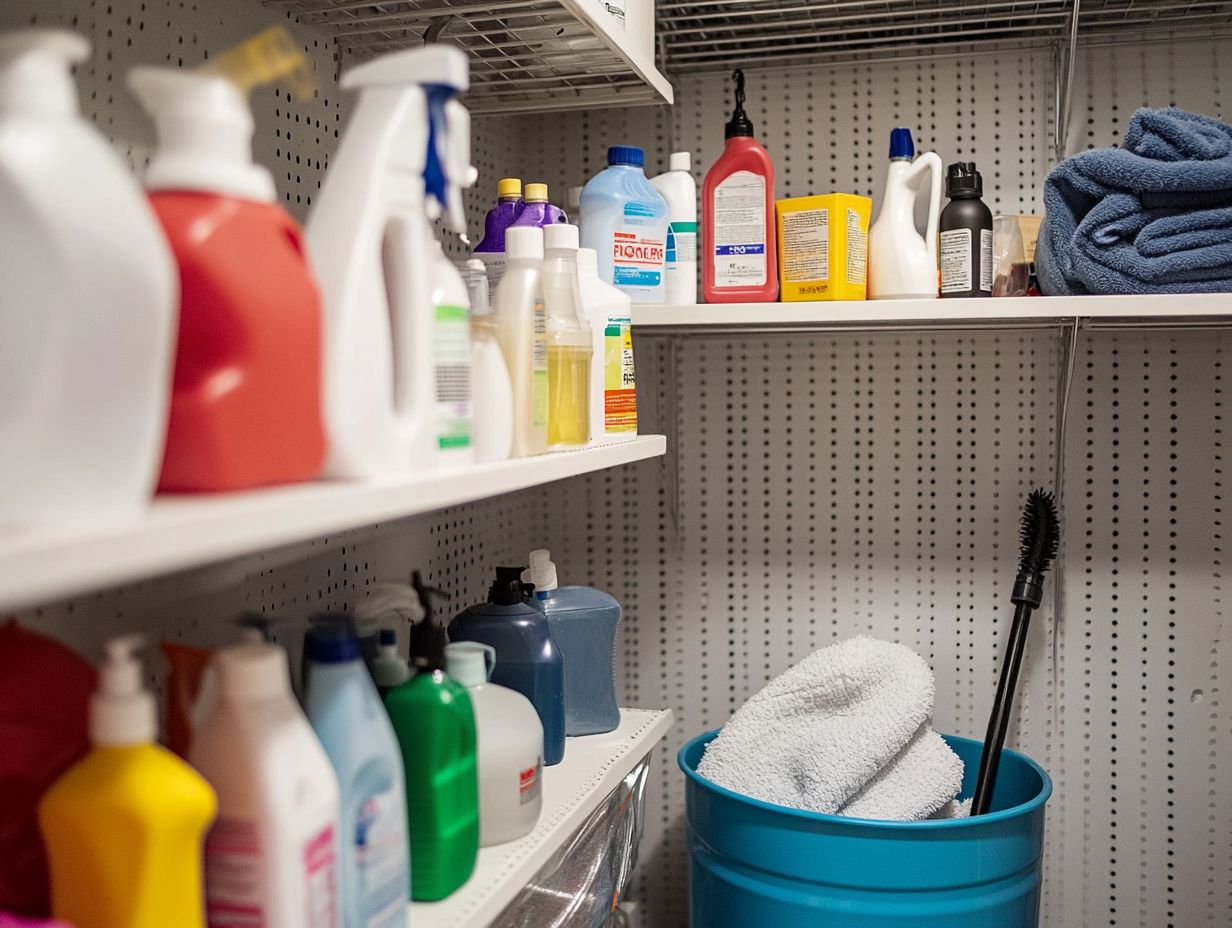
When storing bleach, it s essential to keep it in a cool, dry place away from direct sunlight and heat sources. Always ensure that it remains in its original container with a secure cap to prevent any leaks or spills. Store bleach separately from ammonia and other cleaning products that could react dangerously. This not only ensures safety but also helps maintain an organized cleaning supply area.
Labeling the storage container clearly is a smart move to prevent any accidental misuse or mixing with incompatible chemicals. Consider using color-coded labels or stickers to make it easy for you to differentiate bleach from other cleaners at a glance.
It s advisable to place bleach on a higher shelf to avoid any accidental spills or access by children and pets. Implementing a storage system that groups similar products together while designating a specific area solely for bleach can further enhance safety and promote efficiency when you need to grab your cleaning supplies.
Regularly checking the integrity of the container and the surrounding area is also a good practice. This way, you can ensure that no chemical fumes are present and that your environment remains hazard-free.
2. Storing Ammonia-Based Cleaners
When storing ammonia-based cleaners, it’s crucial to keep them in a cool, well-ventilated area to minimize safety hazards. Always store these products in their original containers, ensuring that safety information is readily accessible.
Avoid placing ammonia near bleach or any acid-based cleaners. Mixing them can create dangerous fumes. This highlights the importance of safe storage practices.
Proper ventilation helps disperse any escaping fumes, significantly reducing the risk of inhalation. Clearly labeling your containers can prevent confusion, making it easier to find what you need quickly.
Establish a dedicated storage space, such as a locked cabinet or a shelf that s out of reach of children and pets. This keeps ammonia-based cleaners separate from other household products.
Keep the storage area dry and free from direct sunlight. This enhances the longevity and effectiveness of your ammonia-based cleaners, allowing you to maintain a safe environment.
3. Storing Acidic Cleaners
When storing acidic cleaners, prioritize using non-reactive containers that don t react chemically with the cleaners. Keep them away from heat sources. These products should remain in their original packaging to have access to essential safety information.
Proper labeling is also important, allowing for easy identification of these powerful cleaning agents while helping you maintain a well-organized cleaning supply storage system.
Opt for containers made from materials like polyethylene or glass, which resist corrosion. This precaution reduces the risk of leaks or reactions that could lead to hazardous situations.
Organize these cleaners in a specific area, well out of reach of children and pets. Consider a color-coded labeling system that identifies each product and indicates its level of acidity. This approach facilitates quick access and minimizes mix-ups during use.
4. Storing Disinfectants
Disinfectants should be stored in a cool, dark environment to maintain effectiveness and prevent degradation. Always keep these cleaning solutions in their original containers to ensure labels remain intact and legible.
By keeping your disinfectants organized, you can maintain a tidy system and ensure quick access to these essential products.
Keep disinfectants away from direct sunlight and heat sources to prevent diminished potency. Designate specific shelves or cabinets solely for cleaning supplies to enhance safety and organization.
Use bins or labels to categorize different disinfectants. This lets you find the right product swiftly and efficiently. Regularly check expiration dates and conduct routine inventory assessments to ensure only safe and effective disinfectants are available.
What Should You Do in Case of a Spill or Accident?
In the unfortunate event of a spill involving cleaning chemicals, immediate action is crucial for safety. First, evacuate everyone nearby to prevent exposure to potentially harmful fumes or substances.
Next, refer to the safety protocols on the product label and take appropriate measures for cleanup, such as wearing safety gear like gloves and masks and using suitable absorbent materials.
Maintain a calm demeanor while managing the situation. If the spill is large or poses a significant risk, activate the emergency response team.
Assess the area for potential hazards and communicate clearly to ensure everyone follows the designated evacuation routes. After securing the area, gather necessary cleanup materials like gloves, goggles, and absorbent pads for safe sanitation.
Keep emergency contact information, including local poison control and health services, readily accessible to expedite assistance if anyone is exposed. By diligently following these steps, you can minimize the impact of the spill, ensuring a safer environment for everyone involved.
How Can You Properly Dispose of Unused or Expired Cleaners?
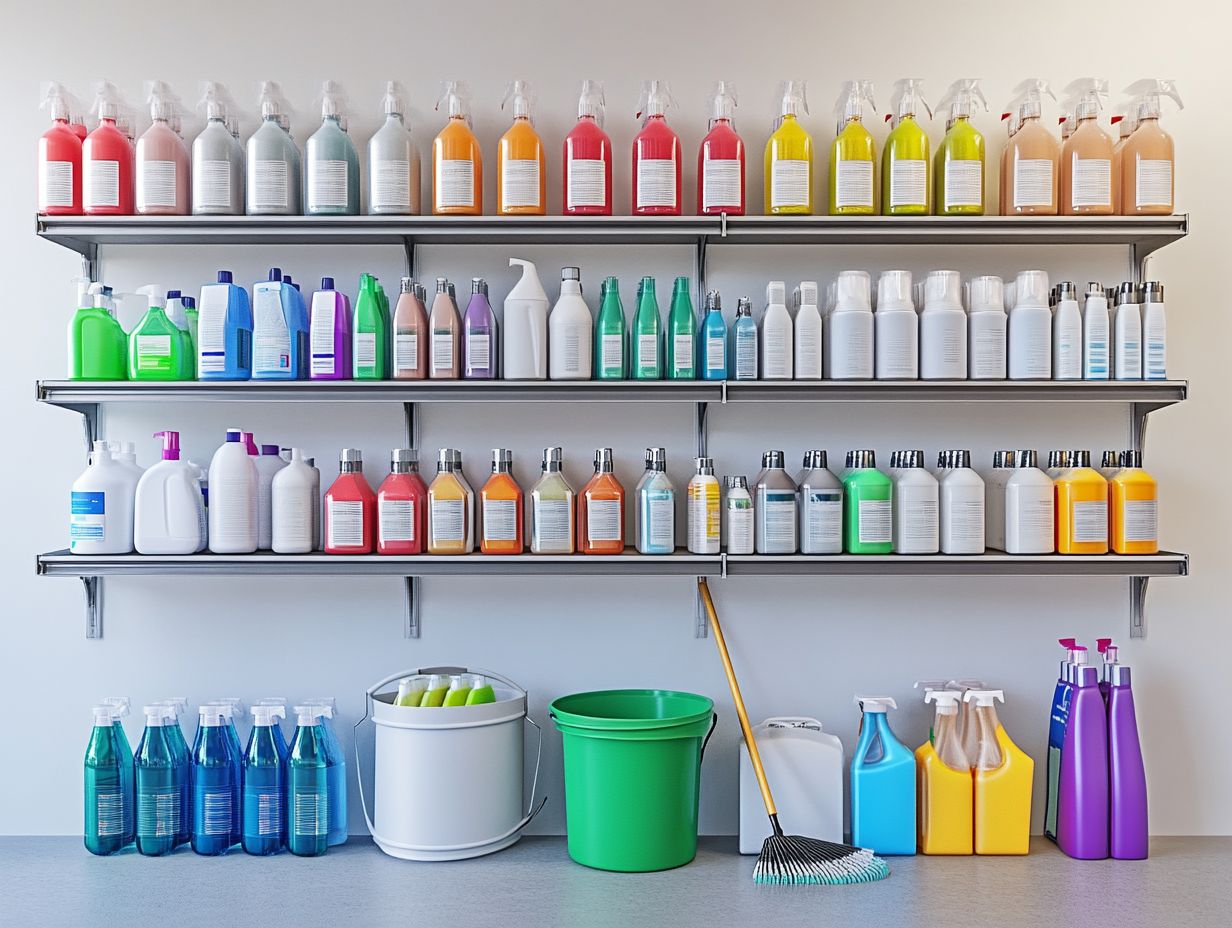
Properly disposing of unused or expired cleaning products is crucial for environmental safety. It also helps prevent accidents. Always follow local regulations for hazardous waste disposal. This may mean taking cleaners to designated facilities or joining community disposal events.
Make it a habit to check that containers are sealed and labeled appropriately to minimize the risk of leaks or spills during transport. Don’t pour chemicals down the drain or toss them in the trash. Protect our environment by disposing of them properly!
Additionally, before disposing of any struggling cleaners, take a moment to see if they can be safely diluted with water or if they need special handling due to their chemical makeup. Many households can benefit from exploring eco-friendly cleaning products, thereby reducing the risk of accumulating hazardous substances.
By staying informed and prepared, you can ensure that your waste management practices are not only effective but also contribute positively to community health and the environment.
Your Cleaning Supply Questions Answered!
What are some tips for storing large quantities of cleaners?
- Keep cleaners in their original containers or properly labeled containers to avoid confusion.
- Ensure that the containers are tightly sealed to prevent spills or leaks.
- Store cleaners in a cool, dry place to avoid potential reactions or degradation of the chemicals.
- Keep them out of reach of children and pets for safety purposes.
- Consider using storage bins or shelves to keep cleaners organized and easily accessible.
- Check the expiration dates on the cleaners and dispose of any expired products.
How should I store bleach and other harsh cleaners?
Store bleach and other harsh cleaners in a locked cabinet or high shelf to prevent accidental ingestion or contact. Keep them away from other cleaning products to avoid potential chemical reactions.
What should I do if I need to store cleaners in a garage or outdoor storage space?
If storing cleaners in a garage, cleaning closet, or outdoor storage space, protect them from extreme temperatures. Consider using a climate-controlled storage unit, storage cabinet, or insulating the storage area to prevent freezing or overheating of the cleaners.
Are there any cleaners that should not be stored in large quantities?
Yes, some cleaners, such as ammonia and oven cleaners, can emit strong fumes. They should not be stored in large quantities. It is best to only purchase and keep enough of these cleaning products for immediate use.
How often should I check and organize my stored cleaners and cleaning supply storage?
Check and organize your stored cleaners at least once every few months. This will help you keep track of expiration dates, dispose of any expired products, and ensure that all containers are tightly sealed. Using labeled containers and following a cleaning schedule can make this process more efficient.
Can I mix different cleaning chemicals when storing them?
No, it is not safe to mix different cleaning chemicals when storing them. This can cause chemical reactions and potentially create harmful fumes. It is best to keep all cleaners in their original containers, use storage bins, and avoid mixing them with other products.
Take a moment to review your cleaning supplies today! Ensure they are stored safely and dispose of any expired or unwanted products properly.

